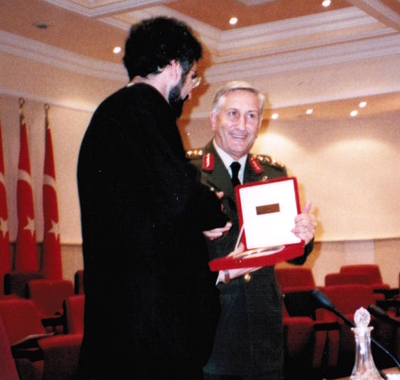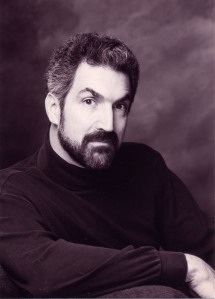Interview with Daniel Pipes: ” The battle against Islamism has not yet started!”

What a real conservative looks like: Margaret Thatcher with Daniel Pipes, 1996.
Global Review had the pleasure to have an interview with Daniel Pipes, expert on Islam and counterjihaddist. Daniel Pipes (born September 9, 1949) is an American historian, writer, political commentator and pro-israel lobbyist. He is the president of the Middle East Forum, and publisher of its Middle East Quarterly journal. His writing focuses on the American foreign policy and the Middle East. He is also an Expert at Wikistrat.
After graduating with a PhD from Harvard and studying abroad, Pipes taught at a number of universities. He then served as director of the Foreign Policy Research Institute, before founding the Middle East Forum. His 2003 nomination by U.S. President George W. Bush to the board of directors of the U.S. Institute of Peace was protested by Arab-American groups, and Democratic leaders, who cited his oft-stated belief that victory is the most effective way to terminate conflict.
Pipes has written a dozen books, and served as an adviser to Rudolph Giuliani´s 2008 presidential campaign. He was in 2008–11 the Taube Distinguished Visiting Fellow at Stanford University´s Hoover Institution.
The Republican Party nominated Donald Trump as its candidate for president of the United States – and Pipes responded ending his 44-year GOP membership. The reasons he laid out in an article in the Philadelphia Inquirer:
“Trump’s boorish, selfish, puerile, and repulsive character, combined with his prideful ignorance, his off-the-cuff policy making, and his neo-fascist tendencies make him the most divisive and scary of any serious presidential candidate in American history. He is precisely “the man the founders feared” in Peter Wehner´s memorable phrase. I want to be no part of this. (…)the conservative movement, to which I belong, has developed since the 1950s into a major intellectual force. It did so by building on several key ideas (limited government, a moral order, and a foreign policy reflecting American interests and values). But the cultural abyss and constitutional nightmare of a Trump presidency will likely destroy this delicate creation (…) For the Republican Party to recover its soul, Trump needs to be thumped in November. Purged of his influence, the party of Lincoln and Reagan can rebuild.”
http://www.danielpipes.org/16834/why-i-just-quit-the-gop
Daniel Pipes has his own blog at: http://www.danielpipes.org/
Global Review: Mr. Pipes, what do you think of Samuel Huntington´s book „Clash of Civilisations“? Are religions the defining moments of culture, despite Enlightenment and globalisation? Where was Huntington right and where wrong ?
Daniel Pipes: Huntington made some very major mistakes which have become increasingly evident in the two decades since he aired his thesis. For example, he thought U.S.tensions with Japan in the 1990s resulted from civilizational differences; a decade later, those tensions disappeared, replaced by far more severe problems with Europe, even though the United States and Europe form part of the same civilization. The real division, as always remains political, not civilizational.
Global Review: Many people say that Islam is not a religion, but a reactionary, totalitarian and repressive ideology comparable with fascism and communism ; and that Islam cannot be reformed. Other people say that Islamism had nothing to do with religion and Islam. What do you think about the relation between Islam and Islamism?
Daniel Pipes: Both these statements are silly. Of course, Islam is one of the major religions of the world; what is there to argue about?Islamism, a modern movement, however shares much with fascism and communism. Islamism is a form of Islam.Denying this would be akin to saying that the Jesuits are not Christians.
Global Review: Some experts compare Islam with Confucianism and Hinduism. They note that in the 50s, Confucian societies were tought unable to develop economically and socially and that Confucianism was seen as an obstacle to progress. Same with Hinduism in India. Today, however, East Asia and India are economic powerhouses and many people perceive Confucianism and Hinduism as driver of this success story. Could the same happen with Islam, that it will also reform?
Daniel Pipes: Yes, it is possible that Muslim peoples will recover from today´s predicament and go on to economic and political success.We have no way of predicting such things. And no civilization or religion is permanently down.

The Hong Kong skyline: No one any more sees Confucianism as an obstacle to development.
Global Review: There is a broad spectrum of Islamists. Al-Qaida, the Islamic State, Boko Haram, Al Shabab which want to occupy territory by military means and create an ever expanding state. And then the Muslimbrothers, the Turkish AKP and the Iranian Khomeinists which want to seize power by a revolutionary mass movement or a mass party and then establish a theocratic system or a Islamist presidential dictatorship. Which of these Islamist groups are the greatest danger for the West and which of these concepts do you think will be the most successful?
Daniel Pipes: I worry most about the subtle, infiltrating Islamists. When it comes to force, we can easily defeat them. But when it comes to our own institutions-schools, law courts, media, parliaments-we are far less prepared to defend ourselves.
Global Review: In the Western countries many Islamophobic parties and politicians are on the rise. Do you think this will help the spread of Islamism or do you think that these parties will support counter-jihad. Hillary Clinton said that Trump and his anti-Muslim speeches are the best recruiters for the Islamic State. True?
Daniel Pipes: I do not regognize the word “Islamophobe” and do not know what it means except, in the immortal phrase of Andrew Cummins as a word “created by fascists and used by cowards to manipulate morons”. Your question reverses the sequence of events. Islamist ideology breeds Islamist violence, which starts the process and in turn inspires anti-Islamic sentiments. Anti-Islamic views might also inspire more Islamist violence, but that is incidental.The real dynamic here is Islamism creating anti-Islam parties. As Norbert Hofer has shown in Austria, they are approaching 50 per cent of the vote and with it, political power.
Global Review: Focusing on “Islamophobic”parties opposition to Islam ignores that they are largley semi-fascist.Gert Wilders says that the Koran is comparable to Hitler´s “Mein Kampf” and that Islam is a totalitarian ideology. Can pepople like this be allies in a fight against Islamism? Maybe Obama and Merkel are weak on Islamism, but would you support Trump, Gert Wilders, Austrian FPÖ, Hungarian Fidesz and antiislamic and antisemitic Jobbik, just because they are against Islam?
Daniel Pipes: Flynn has some good instincts, but does not know the topic well. He has a lot to learn.
Global Review: The failed counter coup in Turkey helps Erdogan to establish his Islamist presidential dictatorship. Do you think that NATO would accept a Islamofascist dictatorship as a reliable member state? Some experts say that Saudi Arabia is also a Islamist dictatorship, but a partner of the USA and the West. Therefore realpolitik will prevail. How do you think the relations between Erdogan-Turkey and the West will develop?
Daniel Pipes: As I understand it, NATO has no mechanism to expel a member state; if that is accurate, it has no choice but to work with Erdogan. In the brief period since the coup attempt, Erdogan has been very hostile to the West. Perhaps he will end up in the Shanghai Cooperation Organisation.

Turkey’s president Erdoğan (R) shakes hands with NATO Secretary-General Jens Stoltenberg
Global Review: Besides Islamists, the West has to deal with Russia, China and Northkorea. How can it deal with all these challenges at the same time? Which counterjihadist strategy do you find most promising?
Daniel Pipes: The strategic enviroment today is far easier than during the cold war; there is no determined ideological enemy with the tools of a great power at its disposal.The key is for the West not to go to sleep. Electing such leaders as Obama and Merkel, however, means going to sleep. The best counter-jihaddi strategy is one that takes ideas seriously.
Global Review: It took the West two decades to get rid of fascism and 70 years to get rid of communism. How long do you think will it take to get rid of Islamism? Are we facing the zenith of Islamism right now or are we just halfway up the road and will it get even worse?
Daniel Pipes: The battle against Islamism has not yet started.I cannot predict how long it will take. It´s pre-1945 in communist terms and the 1930s in fascist terms. I see Islamism as having peaked in 2012-2013 and showing signs of weakness.
Global Review: Will the bad experience with Islamism and secular (military) dictatorships in Muslim countries create a new democratic movement and a new Muslim spring in the future after a catharsis? Or do you think these countries are all failed countries which will disintegrate because they are incapable of changing course?
Daniel Pipes: Muslims are learning bitter lessons from the Islamist experience.I hope they will put these to good use, though so far there is little evidence of this happening.

General Cevik Bir and Daniel Pipes at the headquarter of the Turkish Army in Ankara 1997–Daniel Pipes is one of the few defenders of the failed military coup in Turkey 2016
